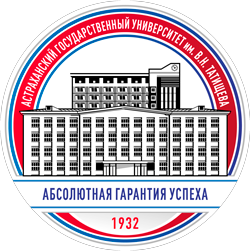The implementation of the educational policy will be connected with the digital transformation of programs in three areas.
Systemic educational changes will affect the educational environment, information content and EPs. It is connected with the creation of conditions for downloading the digital footprint of each participant of the educational process: developing a model of competencies, unified technological standards and EPs for working with the digital footprint as well as developing a community of specialists, working with the digital footprint in education, the university’s educational information content through its own unique groundwork as well as through access to external digital platforms and online learning platforms, the use of big data processing methods, virtual and augmented reality technologies, block chain technology, Internet of Things technology for the development of EPs and IEPs, a mandatory inclusion of assessment tools for testing digital competencies and skills into finds, development of EPs for advanced training for additional EPs in the field of digital economy.
The development of EPs will be connected directly with the digital profiling EPs[1], the extended range of additional EPs for students of IT non-core areas (for their future professional adaptation in the professional world)[2], the extended range of profiles of EPs from the list of training fields for professions and specialties of educational programs of higher education with the building of two or more key competencies of the digital economy.
The development of digital competencies and skills of using digital technologies among students will be made through:
– preliminary study in the information technologies field[3], an IT action group from among students working with employees, students and other various groups of the region population;
– updating the content of EPs for digital, elective courses aimed at mastering algorithms and programs suitable for practical application as well as skills for using and mastering new digital technologies, an intra – university project for the exchange of digital skills between students and “My digital Environment” students, professional training at the stage of mastering the main professional program in priority areas.
– monitoring digital performance using the service “Achievement profile” and elaboration of an individual program of development, startups as the graduation theses, intensive courses in programming, project session on technology for navigation in space (including their relevance to the objectives, the personal qualities and abilities of the student);
– integration into EP’s structure of the subjects (modules) aimed at mastering more than 2 competencies of digital economy[4] that will increase the number of students with digital competencies from 1360 people in 2021 to 12408 people on full time.
The improvement of digital competencies and skills of using digital technologies by teachers will be implemented by means of the development of digital literacy and digital culture and it includes the following activities: an individual program of digital development of each employee[5] of the University, a digital assistant created under psychological and digital profile, a system monitoring once every three months the digital success of the University and rating digital literacy, professional development and retraining of the ASU’s academic stuff in the implementation of the educational process on the basis of DCs; training in the form of online and offline practical monthly meetings for working out specific situations of communication with other users of social networks, presentation of information about yourself to build the skill of correct self-presentation in the information space, participation in project sessions to create digital competencies, as well as to support students startups.
[1] For example, “Psychology of digital education”, “Digital Pedagogy”, “Digital technologies in crop production” etc.
[2] For example, the implementation of programs “Digital education technologies”, “Digital tools for building a healthy eating culture”, etc.)
[3] A preliminary study training course for the 1-st year students (adaptive, depending on the level of digital literacy).
[4] Modules “Technologies of digital education”, “Information technologies in professional activity”
[5] based on the test results of the online programs “Digital dictation” (https://digitaldictation.ru), “Digital citizen” (https://it-gramota.ru) and others, as well as private test resources
